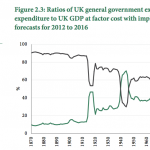 Few people would tolerate a country in which the poor starved or went homeless and yet in Wycombe food is provided by the One Can Trust and emergency winter shelter by Wycombe Homeless Connection. Last time I divided the social security budget (£207bn) by the number of people in poverty (13m), the figure of almost £16,000 was higher than the income of over half the population. Despite spending so much money, the welfare state fails to keep people to a decent standard.
Few people would tolerate a country in which the poor starved or went homeless and yet in Wycombe food is provided by the One Can Trust and emergency winter shelter by Wycombe Homeless Connection. Last time I divided the social security budget (£207bn) by the number of people in poverty (13m), the figure of almost £16,000 was higher than the income of over half the population. Despite spending so much money, the welfare state fails to keep people to a decent standard.
And yet, as the Autumn statement showed, we are finding increasingly that we cannot afford what we have. As I pointed out in my question on the Statement, just 6% of the public realise this Government has been forced to raise the national debt while clearing up after Labour.
Politicians have long been selling cruel fairy tales. For forty years, those promises have been paid for through deficit spending, debt and easy money. That has now run into the buffers. It’s something I have blogged about and spoken about often. For example, here’s a post on the decline of the state and another including the relevant charts plus a speech on the cruel fiction of state power.
So I was pleased this weekend when both the Telegraph and the FT began seriously to step up to the terms of debate now required. Janet Daley wrote The West is signing its own death sentence:
When the Edward Gibbon of the 22nd century comes to write his History of the Decline and Fall of the West, who will feature in his monumental study of the collapse of the most successful economic experiment in human history? In this saga of the mass suicide of the richest nations on earth, there may be particular reference to those national leaders who chose to deny the reality that was, from the vantage point of our future chronicler, so obviously looming. Or maybe the leadership of our day in Washington, London and Brussels will appear to have been swept helplessly along by irresistible forces that originated before their time.
And for the FT, Janan Ganesh explained Britain needs another grand vision tailored to what it can afford (£):
The UK’s problem is not a hasty disavowal of the postwar settlement but, if anything, a squeamish reluctance to question it. The country thinks it is engaged in a painful conversation about the affordability of the state. In fact, it is only skirting the subject.
As can be seen from the comments on the Telegraph article, many people will indignantly insist that this conversation ought not to take place but, with even Labour MP Stella Creasy calling for a zero-based review, it seems a new debate is now emerging on the scope and role of the state.
Good. Like it or not, the evidence is that the taxable capacity of the British economy is about 40% of GDP. State spending must come below that level and stay there if this country is to have a future of sustainable prosperity.


















Well said, Steve! I too thought that Janet Daley’s piece was superb. And blow me if there wasn’t a short item on Newsnight last week about the role of the state. Jamie Whyte and Nassim Taleb were very good.